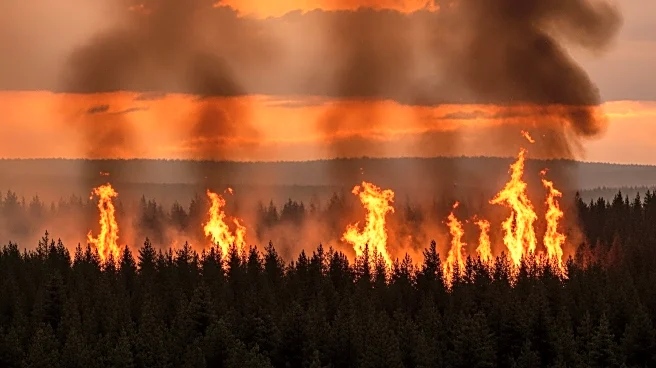What's Happening?
The World Meteorological Organization (WMO) has reported a record increase in global carbon dioxide levels in 2024, largely attributed to wildfires in South America. The Amazon rainforest experienced unprecedented wildfire emissions, exacerbated by the
El Niño phenomenon, which led to drought and high temperatures. The WMO's Greenhouse Gas Bulletin highlighted that the global average concentration of CO2 rose by 3.5 parts per million from 2023 to 2024, marking the largest yearly increase since 1957. This surge is linked to both human activities and the diminished capacity of land and oceans to absorb carbon, further intensifying the planet's warming.
Why It's Important?
The increase in CO2 levels has significant implications for global climate change, as it contributes to extreme weather events and economic losses. The WMO emphasizes the urgency of reducing emissions to safeguard climate stability, economic security, and community well-being. The record CO2 levels breach the 1.5°C threshold set by the Paris Agreement, underscoring the need for immediate action to mitigate climate impacts. The rise in greenhouse gases, including methane and nitrous oxide, further complicates efforts to control global warming, affecting ecosystems and human health.
What's Next?
Efforts to reduce emissions are critical, with potential declines in fossil fuel emissions anticipated. However, the impact of wildfires may counteract these reductions. The WMO suggests that terrestrial and ocean CO2 sinks are becoming less effective, which could accelerate global warming. Policymakers and environmental groups may push for stricter regulations and innovative solutions to enhance carbon absorption and reduce emissions. The ongoing climate negotiations and international cooperation will play a crucial role in addressing these challenges.
Beyond the Headlines
The ethical and legal dimensions of climate change are increasingly relevant, as nations grapple with the responsibility to reduce emissions and protect vulnerable populations. The long-term shifts in climate patterns may lead to changes in agricultural practices, water resources management, and urban planning. The cultural impact of climate change is also significant, as communities adapt to new environmental realities and advocate for sustainable practices.















